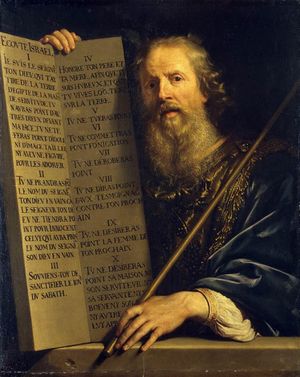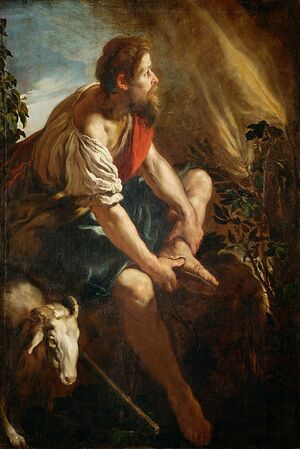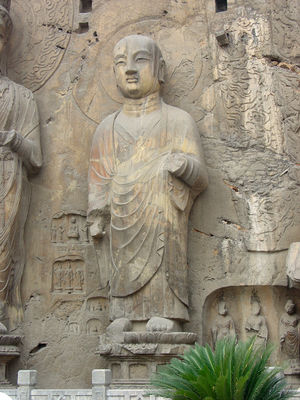Lord Ling/es: Difference between revisions
(Created page with "En un punto del viaje, Dios llamó a Moisés al monte Sinaí durante cuarenta días y cuarenta noches para que recibiera el primer grupo de tablas de la Ley. Pero mientras él...") |
(Created page with "Los hijos de Israel estaban llamados a ser un pueblo santo, pero en aquel momento no encarnaban la santidad de Dios. Durante la ausencia de Moisés, adoraron el becerro de oro...") |
||
| Line 29: | Line 29: | ||
En un punto del viaje, Dios llamó a Moisés al monte Sinaí durante cuarenta días y cuarenta noches para que recibiera el primer grupo de tablas de la Ley. Pero mientras él hacía eso, los hijos de Israel se rebelaron contra Dios y el gurú. Estas tablas tenían inscritas las alianzas que Dios deseaba hacer con un pueblo santo. Contenían largas y detalladas afirmaciones delineando la manera en la que un pueblo patrocinado por Sanat Kumara debía recorrer el sendero de discipulado bajo la Ley y bajo el gurú. | En un punto del viaje, Dios llamó a Moisés al monte Sinaí durante cuarenta días y cuarenta noches para que recibiera el primer grupo de tablas de la Ley. Pero mientras él hacía eso, los hijos de Israel se rebelaron contra Dios y el gurú. Estas tablas tenían inscritas las alianzas que Dios deseaba hacer con un pueblo santo. Contenían largas y detalladas afirmaciones delineando la manera en la que un pueblo patrocinado por Sanat Kumara debía recorrer el sendero de discipulado bajo la Ley y bajo el gurú. | ||
Los hijos de Israel estaban llamados a ser un pueblo santo, pero en aquel momento no encarnaban la santidad de Dios. Durante la ausencia de Moisés, adoraron el becerro de oro. Cuando Moisés descendió de la montaña y vio la testarudez de la gente y su aceptación del materialismo, rompió las tablas. Las alianzas detalladas se perdieron así, y serían remplazadas más tarde por diez simples mandamientos que Dios inscribió en un segundo grupo de tablas. La prueba del pueblo sería «la prueba del diez», que es la prueba del chakra plexo solar.<ref></ref> | |||
After leading the children of Israel for forty years through the wilderness, Moses was not permitted to enter the Promised Land, but only to view it from Mt. Nebo just before his passing, because in anger he smote the rock to receive the waters rather than to lovingly invoke them and receive them.<ref>Num. 20:3–12.</ref> And although he liberated the Hebrew people from Egyptian slavery, Moses did not balance his [[threefold flame]], for his service was lacking in the quality of joy. His pink plume of divine love did not match the fiery intensity of his devotion to the will of God. | After leading the children of Israel for forty years through the wilderness, Moses was not permitted to enter the Promised Land, but only to view it from Mt. Nebo just before his passing, because in anger he smote the rock to receive the waters rather than to lovingly invoke them and receive them.<ref>Num. 20:3–12.</ref> And although he liberated the Hebrew people from Egyptian slavery, Moses did not balance his [[threefold flame]], for his service was lacking in the quality of joy. His pink plume of divine love did not match the fiery intensity of his devotion to the will of God. | ||
Revision as of 03:05, 5 April 2020

El Señor Ling estuvo encarnado como Moisés desde mediados del siglo XIV hasta mediados del siglo XIII a.C. Durante esa vida como profeta, estadista y legislador hebreo, el Dios Ling fue inspirado por su gurú, un ser cósmico que patrocinó al pueblo hebreo, y por Micah, el Ángel de la Unidad.
Encarnaciones
Moisés
Moisés nació unos trescientos años después de la muerte de José, hijo de Jacob. En aquella época los israelitas se habían multiplicado en Egipto hasta llegar a ser una gran población. Según el libro de Éxodo, que cuenta la historia de Moisés, llegó al trono un faraón que no conocía a José. Este faraón esclavizó a los israelitas, pero su gran población y fortaleza seguía incomodando al faraón, quien ordenó a todos los hebreos que se arrojaran al río a todos los varones que les nacieran.

Cuando Moisés nació, su madre lo escondió hasta que llegó a los tres meses de edad. Entonces hizo un arca de juncos donde puso al niño. Luego puso el arca en el río. La hija del faraón encontró a Moisés y se apiadó de él. La hermana de Moisés lo observó al encontrarse cerca y le dijo a la hija del faraón que podía encontrar a una hebrea que lo amamantara. Luego fue por la madre de Moisés. La hija del faraón adoptó al niño y pagó a su madre para que lo amamantara.
La Biblia nos dice que Moisés «fue enseñado en toda la sabiduría de los egipcios; y era poderoso en sus palabras y obras»Cite error: Invalid <ref> tag; refs with no name must have content. De hecho, había llevado a cabo grandes actos meritorios y había pasado muchas pruebas en vidas anteriores. Su alma fue elegida para la misión porque había demostrado valer para ella.
Moisés vivió como un egipcio de rango principesco hasta la edad de aproximadamente cuarenta años, cuando Éxodo cuenta que «salió a sus hermanos, y los vio en sus duras tareas, y observó a un egipcio que golpeaba a uno de los hebreos, sus hermanos. Entonces miró a todas partes, y viendo que no parecía nadie, mató al egipcio, y lo escondió en la arena»Cite error: Invalid <ref> tag; refs with no name must have content.
Aquí, el primer acto de Moisés que consta públicamente, tomó la justicia en sus propias manos y por primera vez enseñó la lástima que sentía por los hebreos. Aunque Dios determinó de antemano que Moisés liberara al pueblo hebreo diciendo «deja ir a mi pueblo», este era un hombre como los demás, y Dios no le eximió de la ley del karma. Por este y otros motivos Moisés no logró la unión con Dios al final de su misión con los israelitas. Dios le exigió que reencarnara para saldar su karma.

Moisés huyó de Egipto hacia la tierra de Madián, donde vivió durante
cuarenta años. La Biblia nos dice que allí fue donde «se le apareció el ángel del Señor en una llama de fuego en medio de una zarza; y él miró, y vio que la zarza ardía en fuego, y la zarza no se consumía». El Señor dijo: «Bien he visto la aflicción de mi pueblo que está en Egipto, y he oído su clamor a causa de sus exactores; pues he conocido sus angustias». Entonces ordenó a Moisés: «Ven por tanto, ahora, y te enviaré a Faraón, para que saques de Egipto a mi pueblo, los hijos de Israel, de Egipto». Moisés dijo: «Si ellos me preguntaren: ¿cuál es su nombre?, ¿qué les responderé?». Dios dijo: «YO SOY EL QUE SOY. Así dirás a los hijos de Israel: YO SOY me envió a vosotros»Cite error: Invalid <ref> tag; refs with no name must have content.
Una vez que el país fue azotado por diez plagas, el faraón egipcio finalmente asintió a dejar marchar a los israelitas, y Moisés los encabezó en su viaje por el desierto hacia la Tierra Prometida.
En un punto del viaje, Dios llamó a Moisés al monte Sinaí durante cuarenta días y cuarenta noches para que recibiera el primer grupo de tablas de la Ley. Pero mientras él hacía eso, los hijos de Israel se rebelaron contra Dios y el gurú. Estas tablas tenían inscritas las alianzas que Dios deseaba hacer con un pueblo santo. Contenían largas y detalladas afirmaciones delineando la manera en la que un pueblo patrocinado por Sanat Kumara debía recorrer el sendero de discipulado bajo la Ley y bajo el gurú.
Los hijos de Israel estaban llamados a ser un pueblo santo, pero en aquel momento no encarnaban la santidad de Dios. Durante la ausencia de Moisés, adoraron el becerro de oro. Cuando Moisés descendió de la montaña y vio la testarudez de la gente y su aceptación del materialismo, rompió las tablas. Las alianzas detalladas se perdieron así, y serían remplazadas más tarde por diez simples mandamientos que Dios inscribió en un segundo grupo de tablas. La prueba del pueblo sería «la prueba del diez», que es la prueba del chakra plexo solar.Cite error: Invalid <ref> tag; refs with no name must have content
After leading the children of Israel for forty years through the wilderness, Moses was not permitted to enter the Promised Land, but only to view it from Mt. Nebo just before his passing, because in anger he smote the rock to receive the waters rather than to lovingly invoke them and receive them.[1] And although he liberated the Hebrew people from Egyptian slavery, Moses did not balance his threefold flame, for his service was lacking in the quality of joy. His pink plume of divine love did not match the fiery intensity of his devotion to the will of God.

Ananda
In Moses’ next embodiment, as Ananda during the sixth century B.C., he became the disciple of Lord Gautama Buddha. Here, at the feet of the most advanced initiate on the planet, he learned how to render service in love and to tap the peace and understanding that come from within the golden flame of illumination.
Lord Ling
Following that embodiment, he lived in China as Lord Ling, one of the ruling class whose high attunement with the Brotherhood enabled him to serve his people through the balanced action of the threefold flame. At the close of that embodiment, he ascended to become the God of Happiness. He then devoted himself to the bright-gold flame of joy on behalf of all evolving upon this planet, for he recognized that without this quality, one cannot ascend nor render a just service unto God and man.
Reflections on his lives
Lord Ling has spoken of his embodiments as Moses and Lord Ling:
I myself did pass into another incarnation, and you have known me in my final embodiment as Lord Ling of China. There I perfected the wisdom, fulfilled the balancing of my karma and did espouse the flame of God-happiness. This I did in view of the great mourning and depression that is carried by so many of the children of Israel and Judah who have gone forth in a state of burden of their karma and in a state of depression concerning their absence of knowledge of the true path of salvation and the promise of heaven and victory on earth.
Some are even wed in a greater way to materialism than they were in the moments when we were in the wilderness and at the foot of Sinai. Yes, beloved, materialism and the pleasures of the senses are addictive. Far from getting better, these addictions get worse.
Thus, I engrave, as God does engrave in your hearts, the true mysteries of the kingdom, the true understanding of the requirements of the Law and the Path. If you are not able to read this writing, know that it does burn within you, that it is a living fire, that it is the fire infolding itself. It is the all-consuming fire of God that will, if you allow it, consume in you all those manifestations less than the fulfillment of the Law.
May you early seek the sacred fire and then the violet flame and then the calls unto the seven archangels. For those of you who have descended from this seed of Abraham, who also descended ultimately from the seed of Sanat Kumara, do indeed have a destiny in this hour; for your training in the ancient golden-age civilization of Jesus Christ does fit you to be true shepherds.
Thus, Jesus knew to whom he was speaking when he said, “Feed my sheep.”[2] There are those who are rightly able and called by their karma and destiny of dharma to feed the souls of the millions upon earth. I call you all to this calling, for you may be adoptive sons who have chosen to enter in to claim your joint heirship with Jesus of the sonship that does belong to all of this seed of light. Therefore, whether you are adoptive sons or count yourselves as those who truly trace their traditions to the beginnings, I am come to draw you into the office of the high calling of your destiny.[3]
His service today
God Ling maintains a focus of the flame of joy in the retreat of Jophiel and Christine in Central China. He often frequents this and other retreats of the Brotherhood, and he uses the flame of joy as a focus, a divine magnet, to draw mankind into the ascended masters’ consciousness. His momentum of great joy gives him a sense of the abundant life, the life holy and beautiful.
When invoking an abundant supply “of every good and perfect gift,” one should call to God Ling in addition to the God of Nature, the God of Gold and Fortuna, the Goddess of Supply.
Sources
Mark L. Prophet and Elizabeth Clare Prophet, The Masters and Their Retreats, s.v. “Ling, Lord (Moses).”
